2018: Year in Chicago Council Surveys
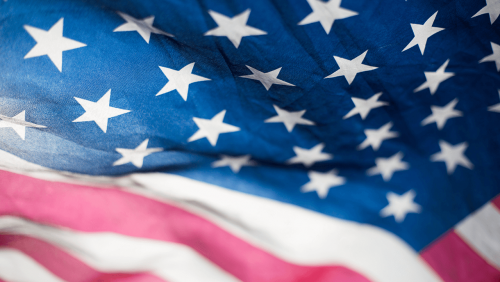
In 2018, the Council captured public and opinion leader attitudes on some of the most pressing foreign policy issues.
It's been a busy, eventful year around the world. Throughout 2018, the Council's polling team explored issues including US-Russia relations, American views of China, public support for internationalism and trade, and how the rising generation of Millennials think about American foreign policy. This is 2018, in polls.
America Engaged: American Public Opinion and US Foreign Policy
In the wake of the 2016 US presidential election, political analysts warned of a dark era ahead. Newly elected President Donald Trump had long expressed opposition to US security alliances, skepticism of free trade, and support for authoritarian leaders such as Vladimir Putin. Since the American public generally relies on their political leaders for foreign policy decisions, many policy watchers cautioned that the country was headed for a populist, unilateralist, and protectionist retreat from global leadership. While the Trump administration has taken action along this path—unilaterally withdrawing from the Paris and Iran agreements, pulling the United States out from the Trans-Pacific Partnership (TPP) trade agreement, and questioning the value of long-time alliances like NATO—the majority of the American public has not followed this lead.
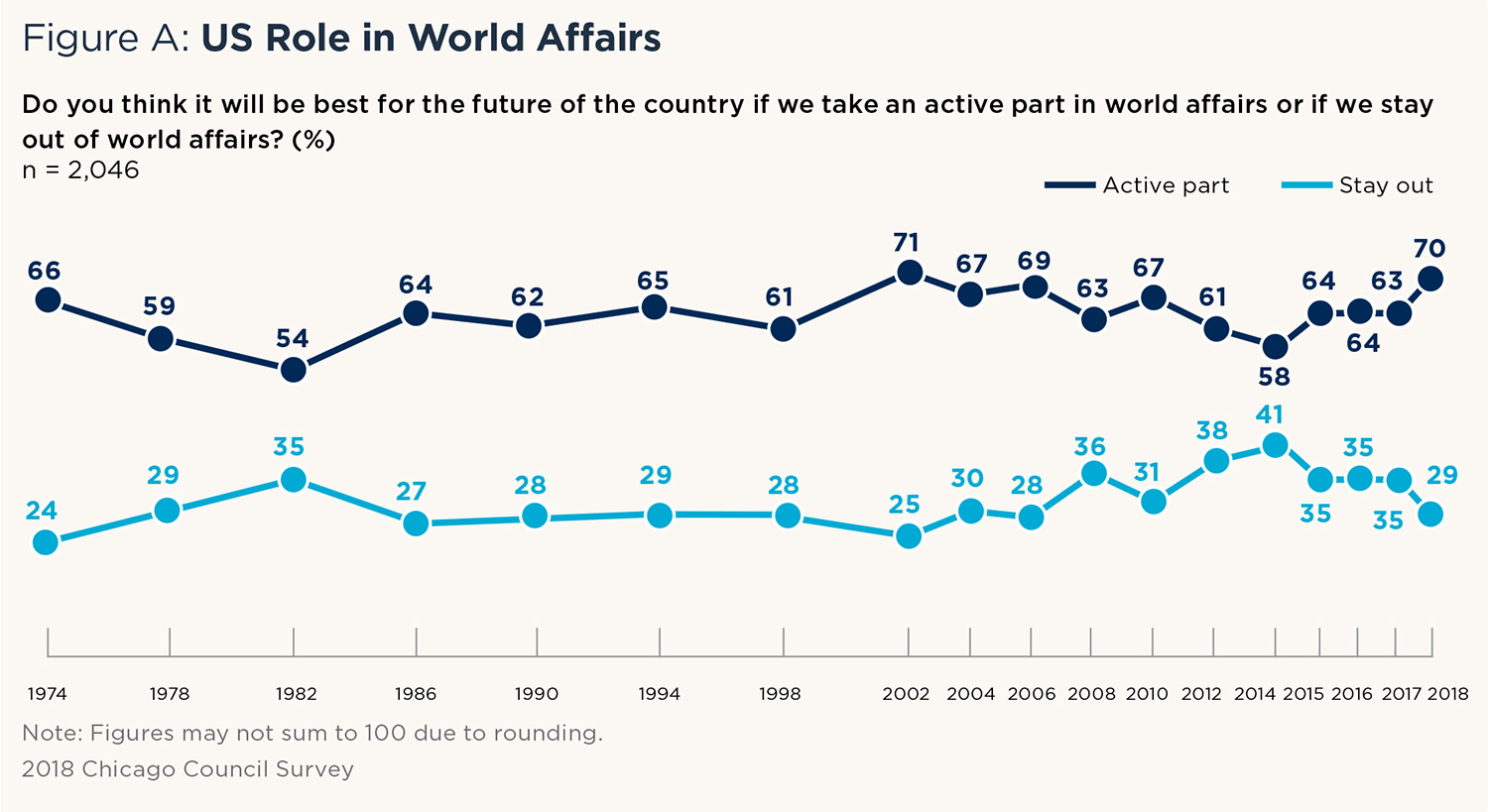
To the contrary, most Americans have moved in the opposite direction. Despite attempts by the White House to pull the United States back from global engagement, seven in 10 Americans (Figure A) favor the United States taking an active part in world affairs (70%). This reading is a 7 percentage point increase from the 2017 Chicago Council Survey and is the highest recorded level of support since 1974 except for 2002, the first Chicago Council Survey conducted after the September 11 attacks.
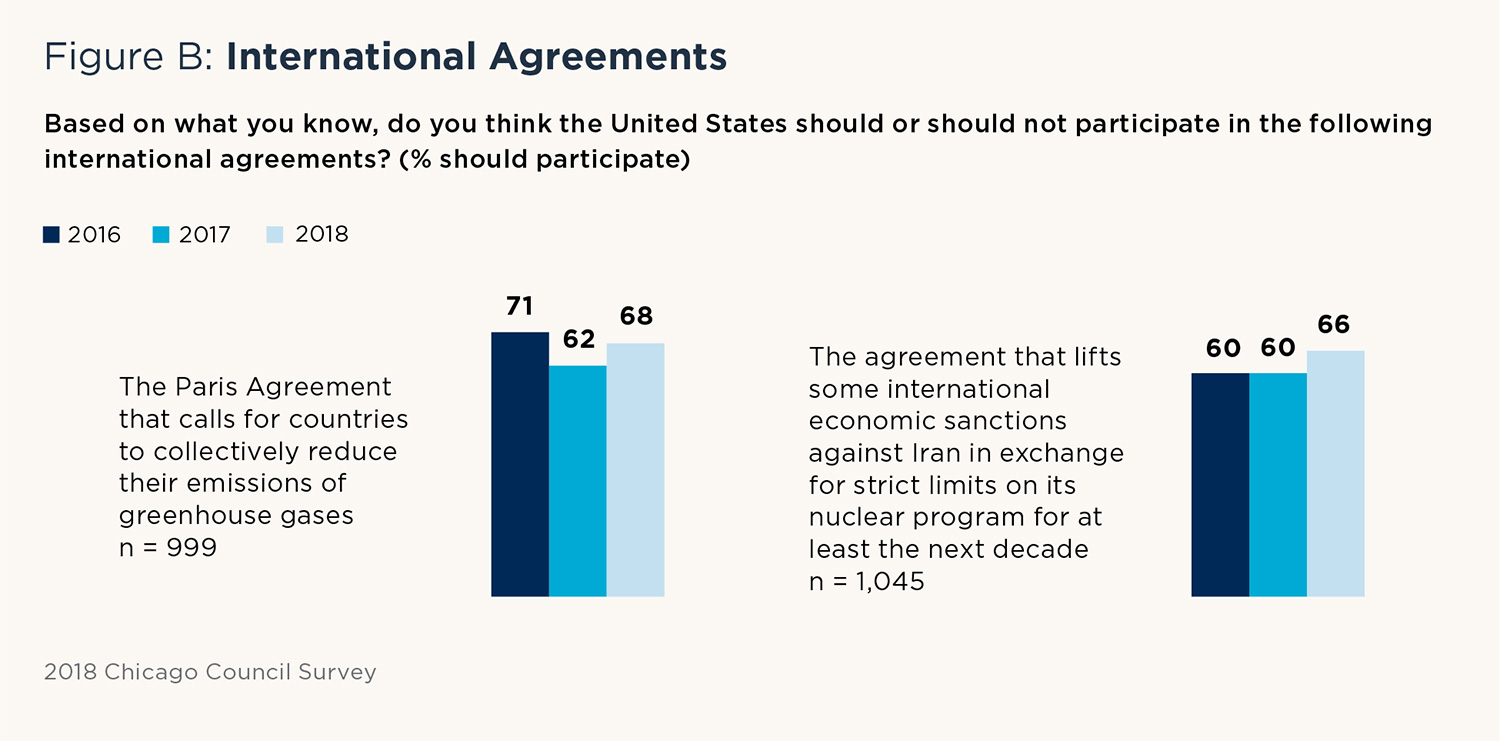
President Trump has broken away from several international agreements since taking office, including the Paris Agreement on climate change and the Iran nuclear deal. But the American public has not followed the president's cues. Majorities of the public say that the United States should participate in the Iran deal (66%) and the Paris Agreement (68%). In fact, support for US participation in both of these high-profile international agreements has risen 6 percentage points over the past year.
Read more from America Engaged: American Public Opinion and US Foreign Policy
Record Number of Americans Endorse Benefits of Trade
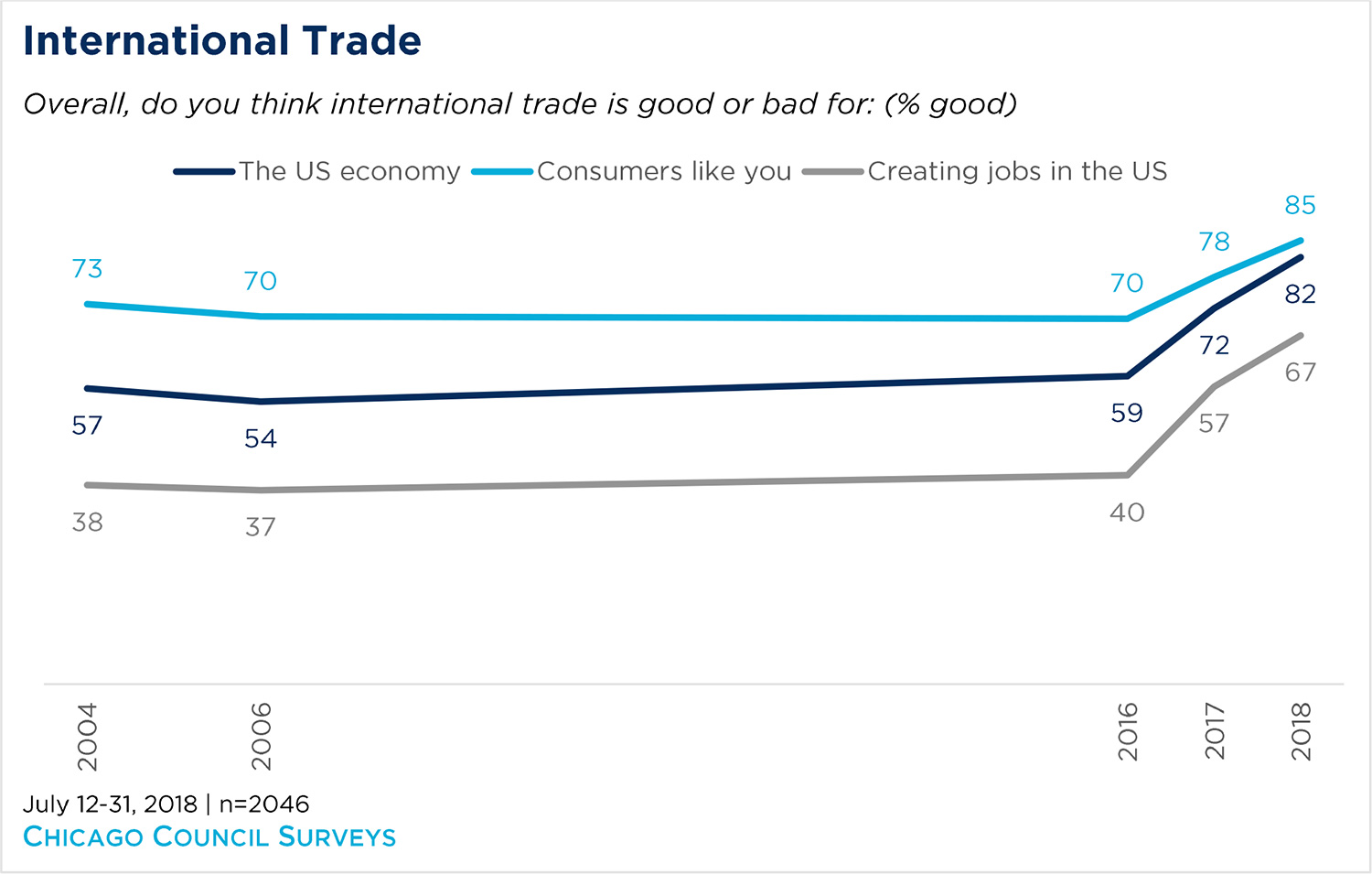
The Trump administration came into office highly critical of the effects of existing trade deals such as NAFTA and TPP on the US economy. The president proceeded to cancel United States participation in the TPP and demanded a renegotiation of NAFTA. He deployed tariffs to get trading partners to agree to new deals and opened up trade battles on a series of fronts. While recent polls show that American views of President Trump's performance on trade are divided along partisan affiliations, the 2018 Chicago Council Survey finds that the largest majorities of Americans yet recorded say that trade is good for the US economy, US consumers, and US job creation. In addition, a growing majority believe that NAFTA is good for the US economy, and six in ten approve of US participation in a renewed Trans-Pacific trade agreement.
Read more from Record Number of Americans Endorse Benefits of Trade
American Support for US Strikes on Syria Split along Partisan Lines
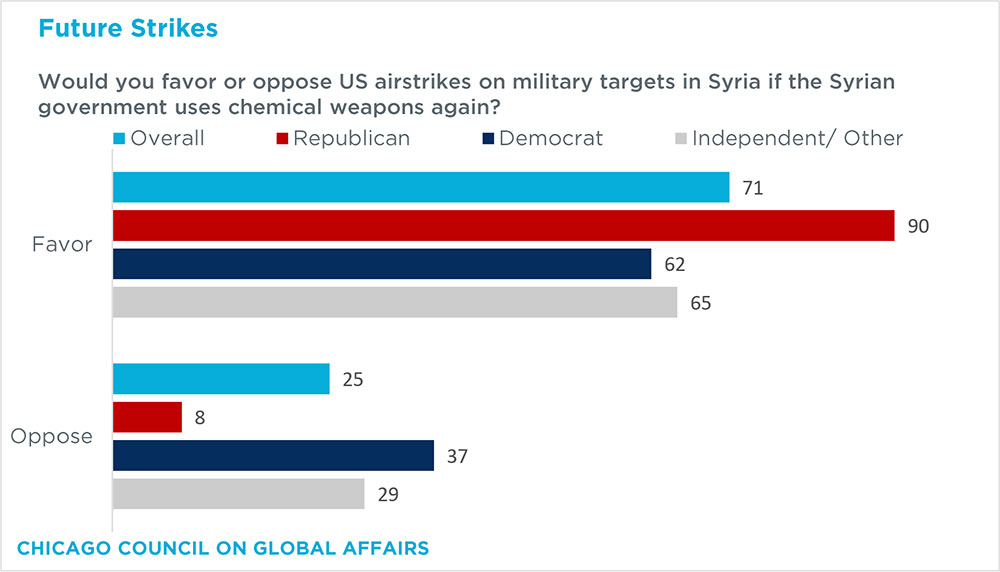
On April 14, 2018, the United States, United Kingdom, and France conducted joint airstrikes against several facilities in Syria believed to be part of the Syrian government's chemical weapons program. This attack was a response to Syrian President Bashar al-Assad's use of chemical weapons in Douma the week before. A majority of Americans expressed support for the strikes, though Democrats tended to oppose them. And majorities among both self-described Democrats and Republicans would favor additional strikes if Syria uses chemical weapons again, though they also expect that future strikes would escalate US-Russia tensions.
Read more from American Support for US Strikes on Syria Split along Partisan Lines
Despite Last Year’s Expectations, Publics Sense Strains in US-Russia Relations
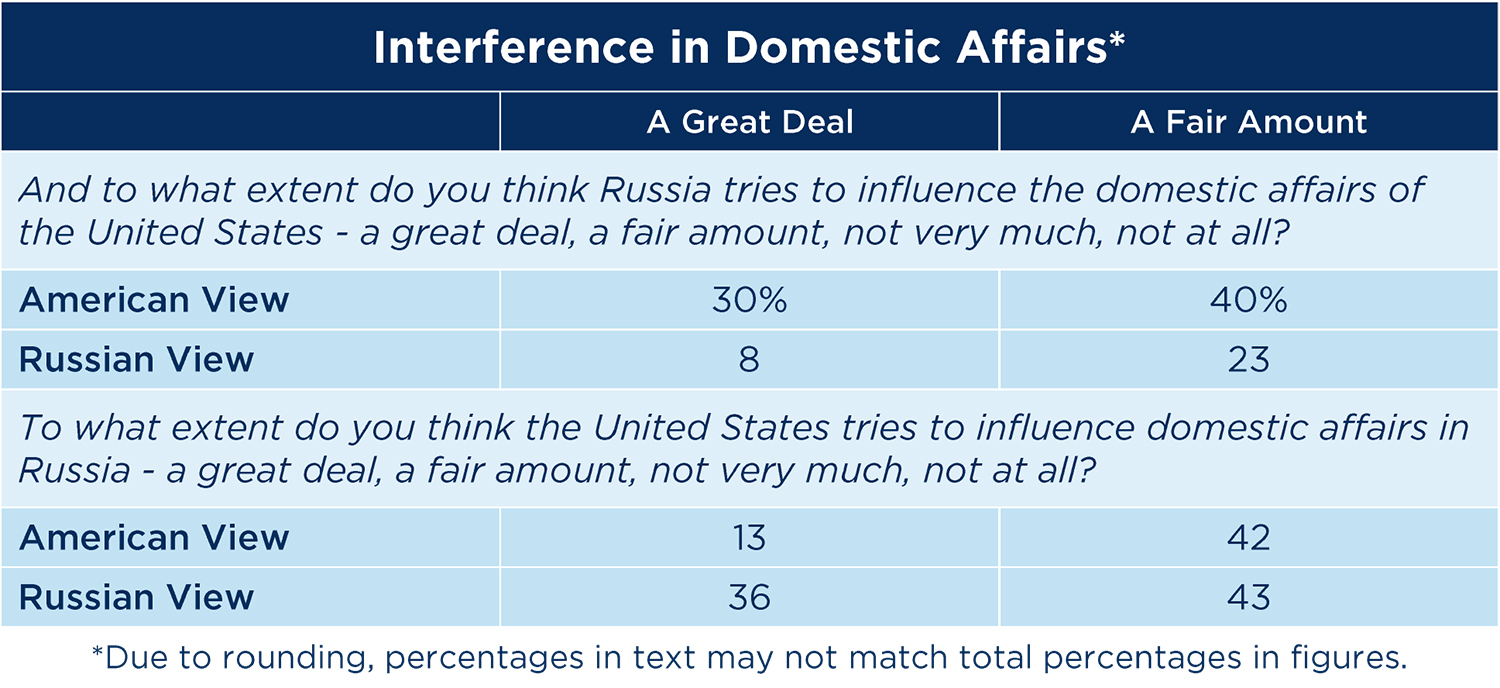
The Trump administration's National Security Strategy states that Russia is trying to "weaken the credibility of America's commitment to Europe, undermine transatlantic unity, and weaken European institutions and governments." At the same time, the Russian government has accused the United States—particularly when Hillary Clinton was Secretary of State—of rabble-rousing in Russia. American and Russian publics echo these accusations of interference. Eight in ten Russians believe that the United States tries to influence Russia's domestic affairs (78%) and that the United States is trying to undermine Russia's international influence and power (81%). Only 31 percent of Russians believe their own country tries to influence the domestic affairs in the United States, but Americans think otherwise. In total, at least seven in ten Americans think that Russia tries to influence the domestic affairs of the United States (69%) and that Russia is actively working to undermine US international influence and power (74%).
Read more from Despite Last Year’s Expectations, Publics Sense Strains in US-Russia Relations
American and Russian Opinion at a Standoff on Crimea Sanctions
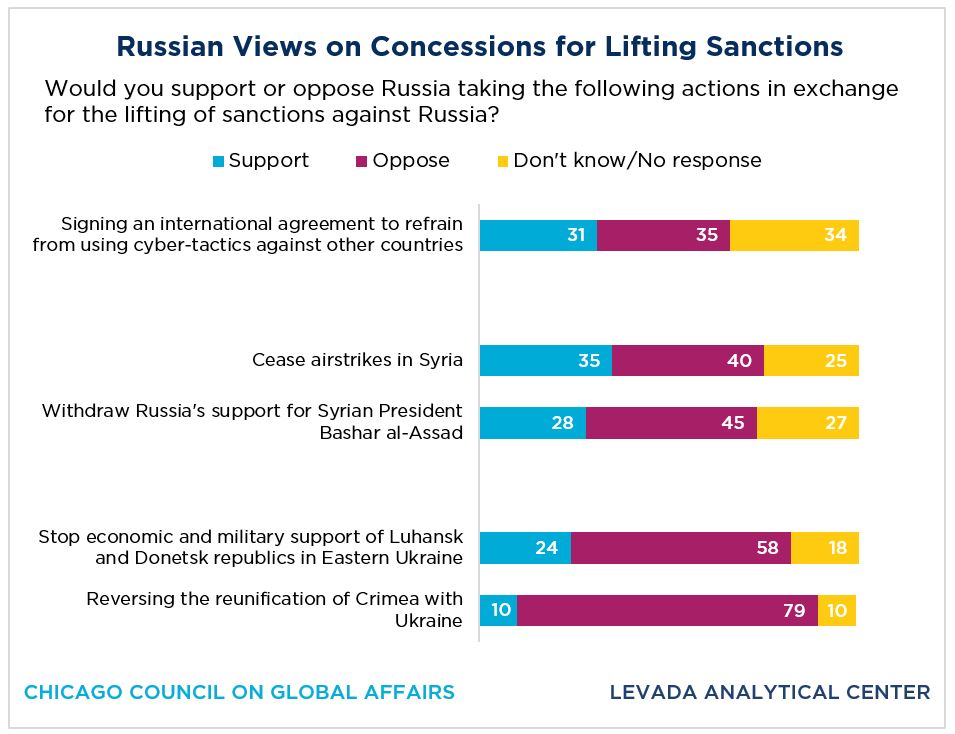
When asked about specific concessions Russia could make in exchange for the United States lifting the sanctions, solid majorities of Russians say they would oppose both reversing the reunification of Crimea with Russia (79%) and stopping economic and military support of rebel separatists in eastern Ukraine (58%; see figure, next page). Russians further think the annexation of Crimea has brought more good (60%) than harm (17%). And two in three Russians (66%) say they are not concerned about international isolation due to their country's official position on Ukraine.
Read more from American and Russian Opinion at a Standoff on Crimea Sanctions
Americans and Russians Agree on Priorities for Syria, Differ on Urgency of North Korea
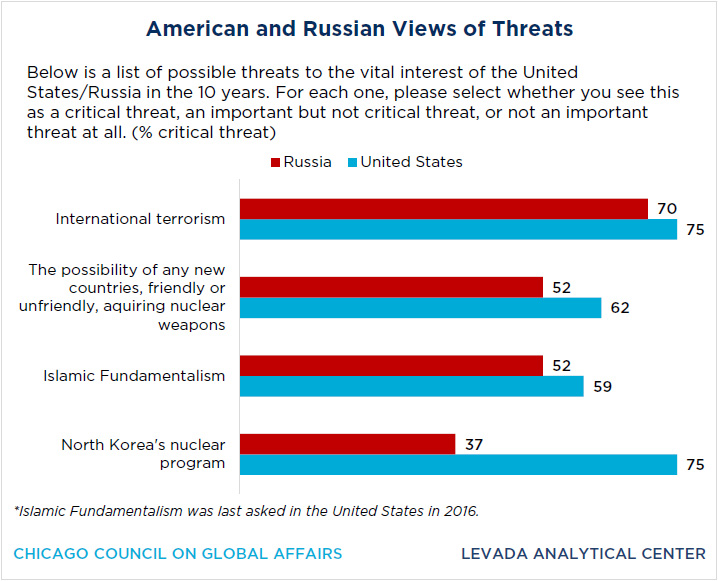
In a holiday greeting to US President Donald Trump, Russian President Vladimir Putin urged "pragmatic cooperation" between the United States and Russia to address global challenges and threats. This message builds upon previous Trump-Putin phone conversations regarding the situation in Syria and threats from North Korea. When asked about a series of potential threats to their country, Russians rate international terrorism the most critical threat (70%), followed by Islamic fundamentalism and the possibility of any new countries becoming nuclear powers (52% each), with less urgent concern about the North Korean nuclear program (37% critical). For their part, equally large majorities of Americans describe international terrorism and North Korea's nuclear program (75% each) as critical threats facing the United States, followed by the possibility of new countries becoming nuclear powers (62%).
US-Russia Experts Paint a Dim Picture of Bilateral Relations Before Summit
"There is a crisis of trust on the one hand and an unwillingness to have a dialogue...and national pride on the other."
"Widespread ignorance of perspective of the other country has made it possible for unhelpful stereotypes on both sides to spread."
Experts on the US-Russia relationship experts on the US-Russian relationship think that decreased communication between the two governments, toxic media coverage, and the natures of both presidents pose formidable challenges to the relationship. Russian and American experts see a real need for cooperation on nonproliferation and arms control. During the Cold War, US-Russian cooperation on nuclear and conventional arms control provided some degree of information-sharing and transparency. Experts warn that the lack of communication on this front today could result in heightened risk for escalation.
Read more from US-Russia Experts Paint a Dim Picture of Bilateral Relations Before Summit
As China Rises, Americans Seek Closer Ties with Japan
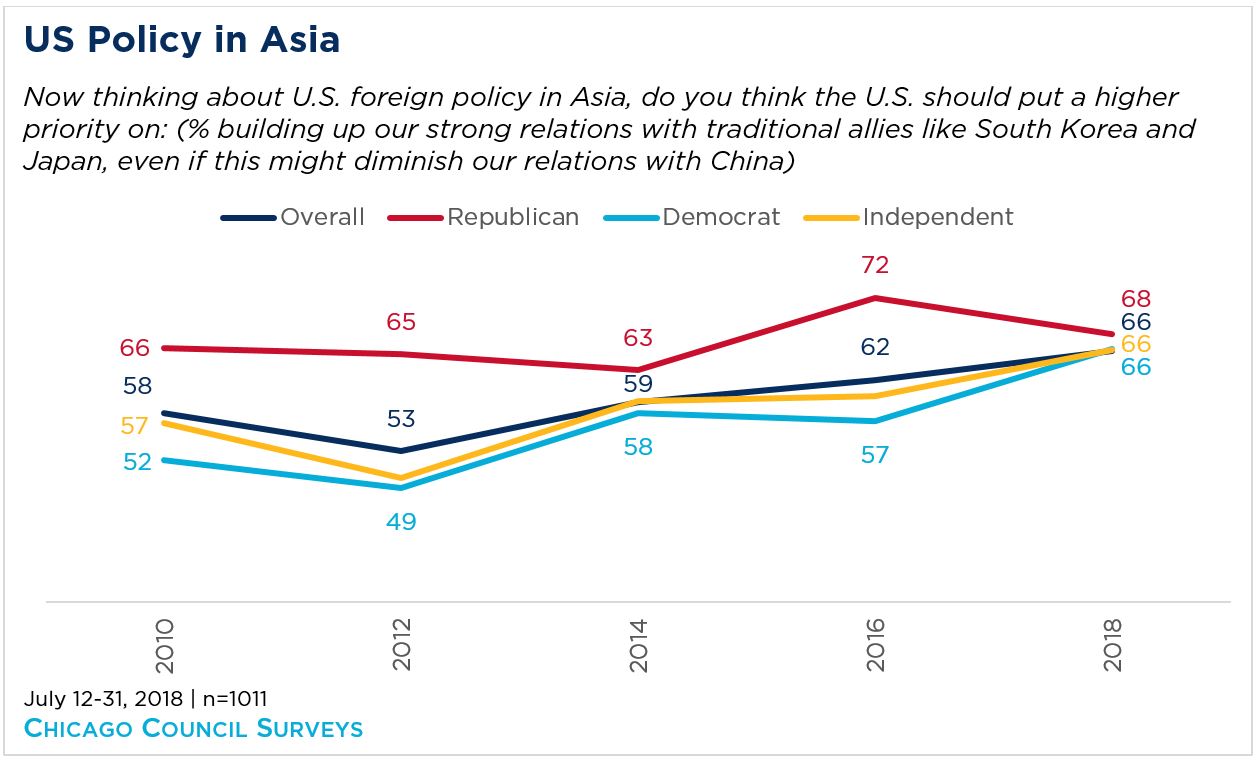
Over the first two years of the Trump administration, the United States has simultaneously aggrieved Japan, a pivotal US ally in Asia, while also taking a more confrontational stance against China. This has raised broad concerns about the future of US involvement in Asia and the basis of support for the US-Japan alliance. While the American public is hesitant to get involved in a conflict between China and Japan, public support for US bases in Japan is at an all-time high, and Americans across party lines want to build strong relations with US allies in Asia.
Read more from As China Rises, Americans Seek Closer Ties with Japan
American Views toward US-Japan Relations and Asia-Pacific Security
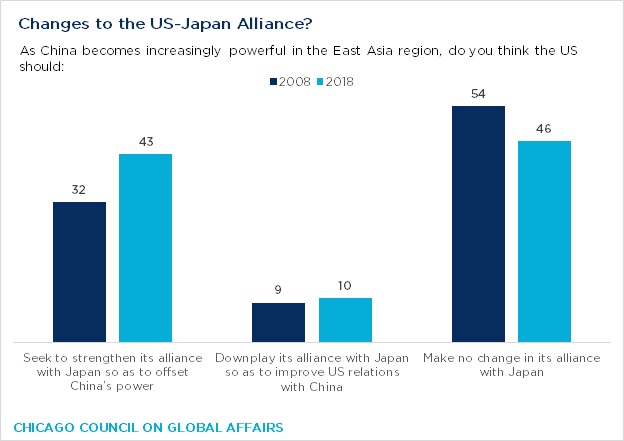
With broad agreement that China's power is on the rise—even if it is not seen as a critical threat—there are questions about how the United States should respond in terms of its alliances in the region. The United States could seek to downplay those alliances in order to better accommodate China or it could bolster those alliances to better deal with a rising China. When it comes to the US alliance with Japan, Americans are clear: the United States should not seek to downplay its alliance with Japan in order to improve relations with China. Just 10 percent view this as the best option. Instead, 46 percent state that the United States should make no changes to the alliance and 43 percent prefer strengthening the US-Japan alliance to deal with a rising China. Support for strengthening the US-Japan alliance to counterbalance China has risen notably since 2008 (from 32% to 43%).
Read more from American Views toward US-Japan Relations and Asia-Pacific Security
Americans Remain Committed to South Korea
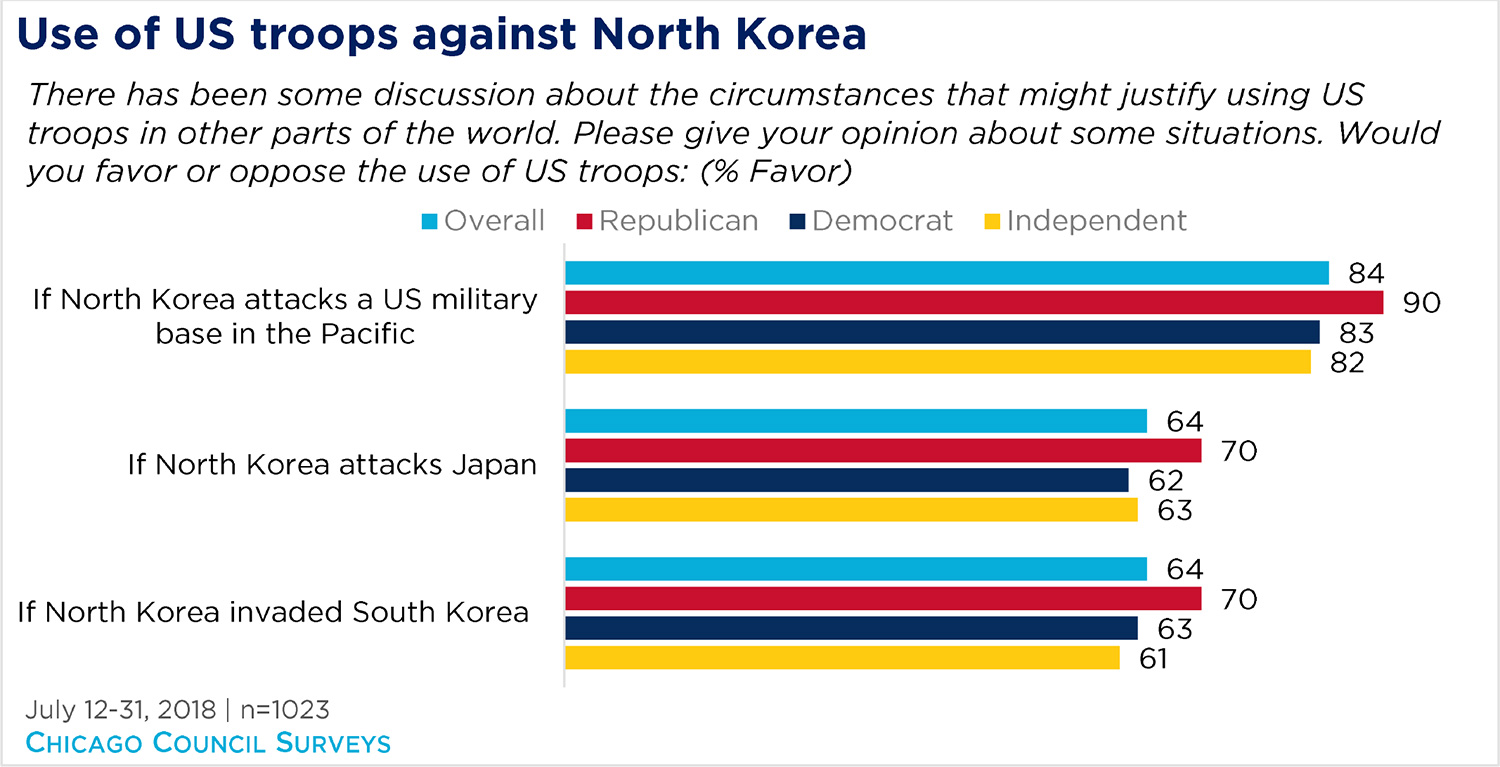
While Americans perceive North Korea's nuclear program as less of a threat to the United States than last year, if North Korea were to attack either South Korea or Japan, bipartisan majorities of Americans are ready to use force to defend these countries. If North Korea invades South Korea, 64 percent of Americans support sending US troops to defend South Korea. This is an all-time high and includes 70 percent of Republicans, 63 percent of Democrats, and 61 percent of Independents. Likewise, if North Korea attacks Japan, 64 percent support using US troops to defend Japan. This is also a record high, including 70 percent of Republicans, 62 percent of Democrats, and 63 percent of Independents.
Read more from Americans Remain Committed to South Korea
China Not Yet Seen as a Threat by the American Public
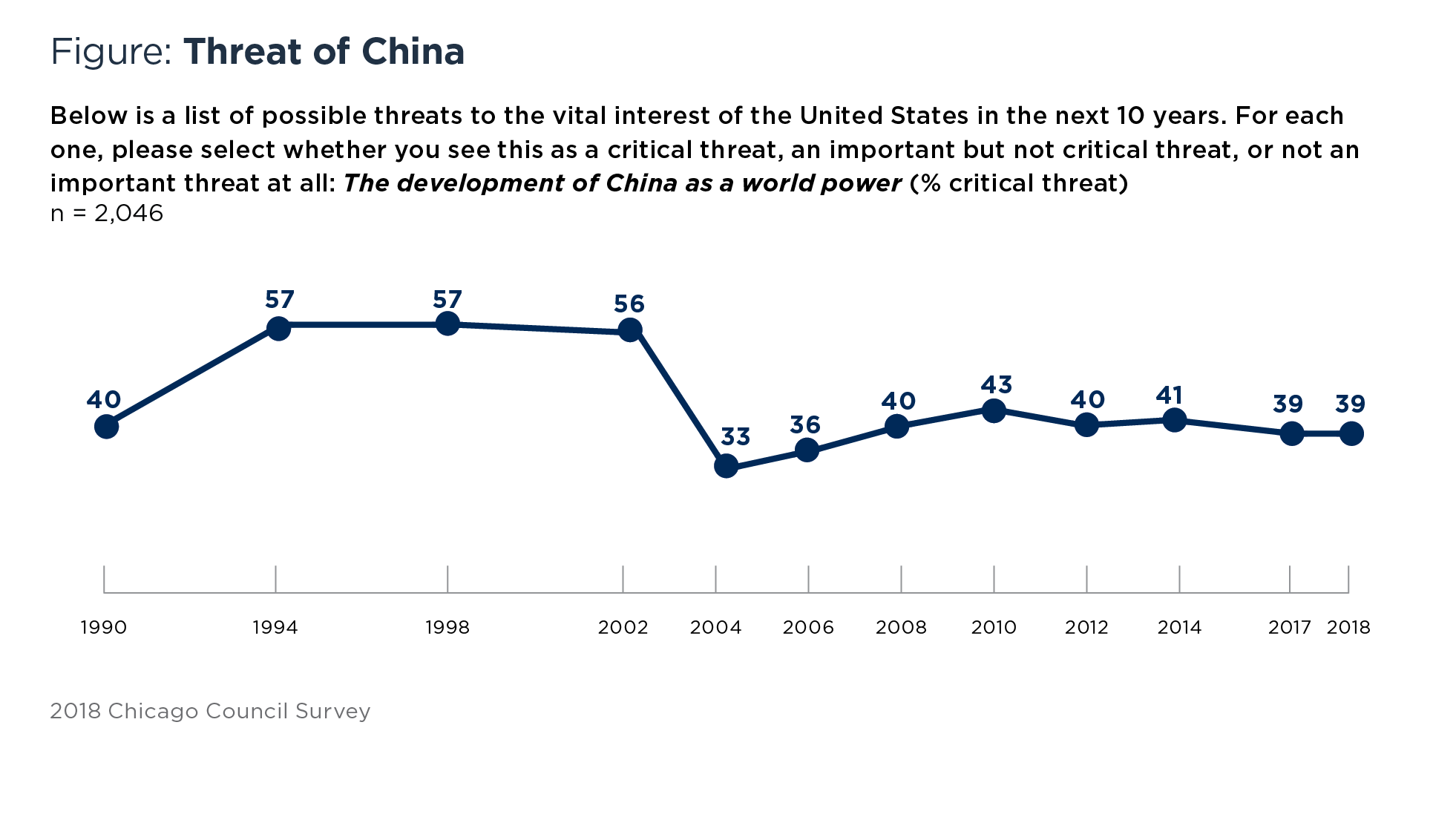
As the United States and China continue to engage in the tit-for-tat trade war that has unfolded throughout 2018, the Trump administration is raising alarms more broadly about the threat China poses to the United States. Administration critiques of Chinese behavior fit within an emerging consensus among the foreign policy establishment that a harder line on China is a necessity. The Trump administration's active efforts to portray China as a bad international actor will further heighten tensions between the two countries, but as of yet, the American public does not yet see China as an urgent threat to national security.
Read more from China Not Yet Seen as a Threat by the American Public
For First Time, Majority of Mexicans Hold Unfavorable View of United States
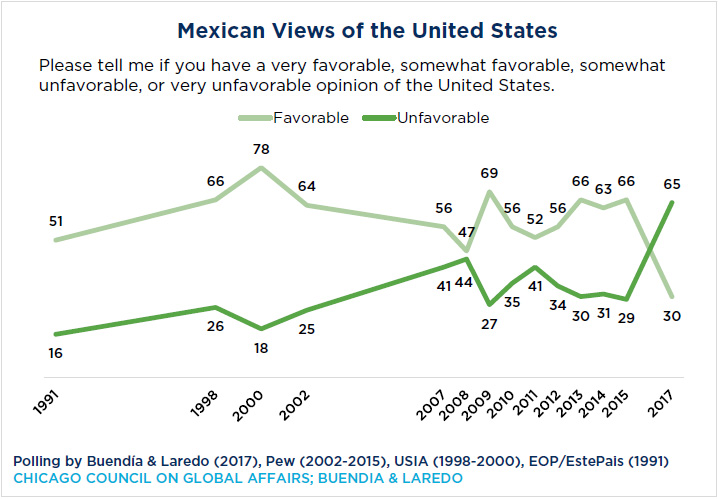
US-Mexico relations have hit a rough patch since the election of Donald Trump in the United States, and not just at the diplomatic level. As a joint Chicago Council-Buendía & Laredo survey showed in January, Mexican public opinion of the United States hit a record low. Two in three Mexicans (65%) expressed an unfavorable view of the United States, while just three in ten (30%) held a favorable view. This represented a stunning reversal of opinion from 2015, when two in three (66%) had a favorable view of the United States and three in ten (29%) had unfavorable views.
Read more from For First Time, Majority of Mexicans Hold Unfavorable View of United States
US Public Divides along Party Lines on Israeli-Palestinian Conflict
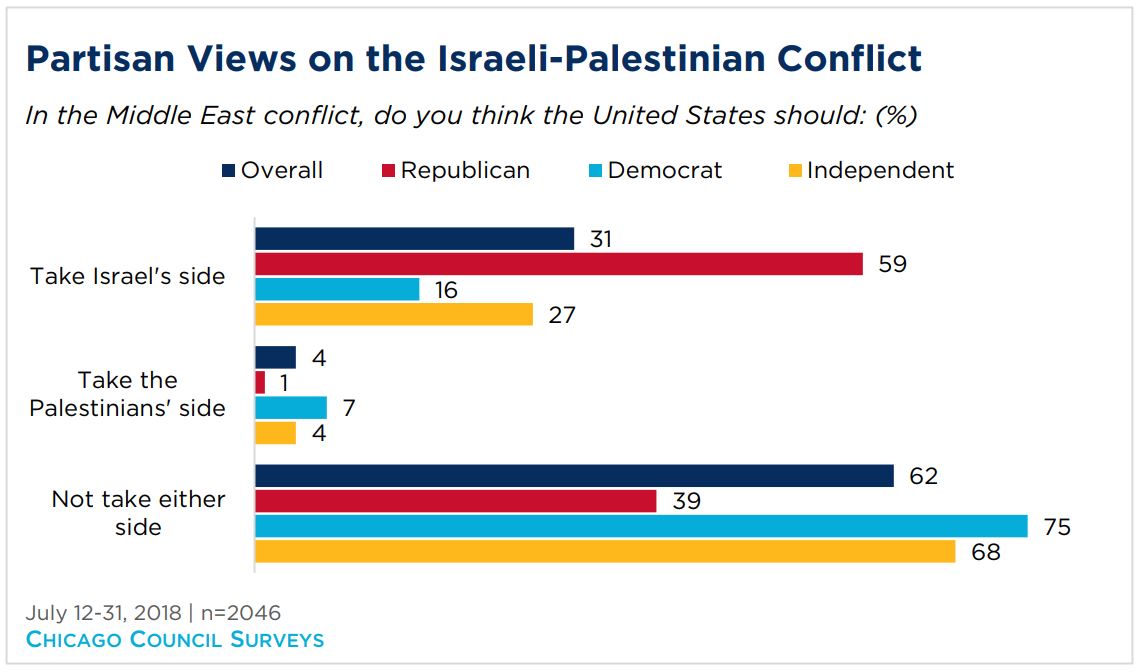
In the past year, the Trump administration has moved the US embassy in Israel to Jerusalem, recognized Jerusalem as Israel's capital, ended aid to the United Nation agency supporting Palestinian refugees, and announced the closure of Palestine Liberation Organization (PLO) office in Washington, DC. These actions, heavily criticized by the international community, are a dramatic shift from past US policy. The 2018 Chicago Council Survey, conducted after the US embassy move to Jerusalem but before the other actions, finds that the American public has generally not formed an opinion about the embassy relocation and would prefer that the US not take a side in the Israel-Palestinian conflict. Republicans (59%) say the US should take Israel's side, while majorities of Democrats (75%) and Independents (68%) say the US should not take either side.
Read more from US Public Divides along Party Lines on Israeli-Palestinian Conflict
The Clash of Generations? Intergenerational Change and American Foreign Policy Views
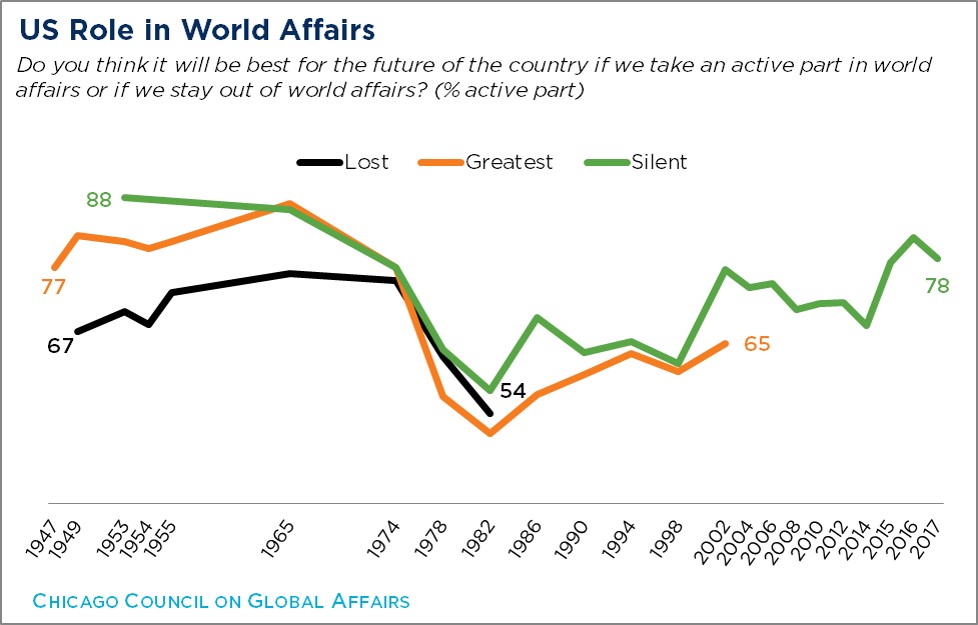
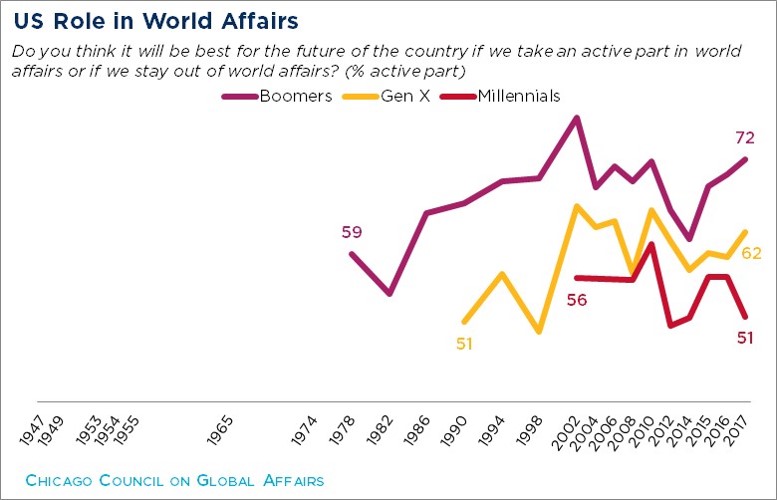
Since World War II the United States has maintained an active foreign policy agenda, deeply engaged in both the economic and military domains. But many observers have worried whether younger Americans will be willing to take up the mantle of global leadership. Those worried about Millennials' willingness to embrace the traditional liberal internationalism of the post-World War II era may find some evidence for their concerns in survey data. Today, each successive generation is less likely than the previous to prioritize maintaining superior military power worldwide as a goal of US foreign policy, to see US military superiority as a very effective way of achieving US foreign policy goals, and to support expanding defense spending. At the same time, support for international cooperation and free trade remains high across the generations. In fact, younger Americans are more inclined to support cooperative approaches to US foreign policy and more likely to feel favorably towards trade and globalization.
Read more from The Clash of Generations? Intergenerational Change and American Foreign Policy Views

